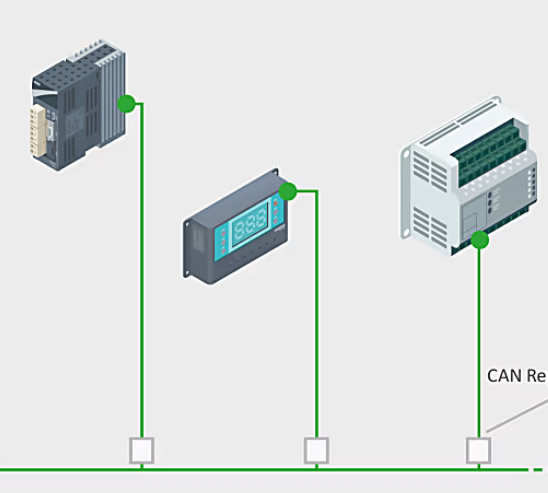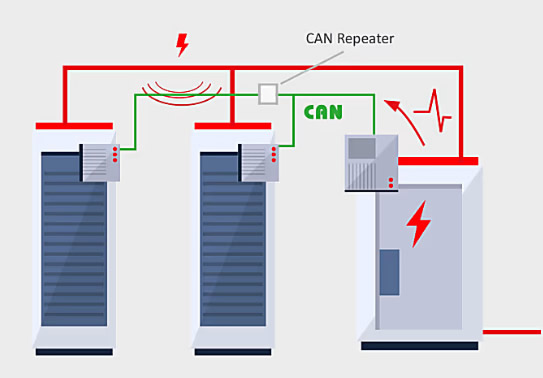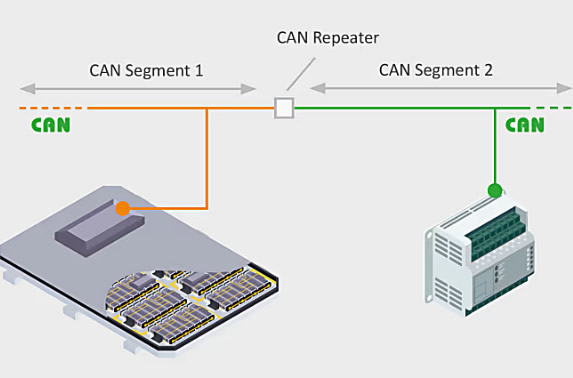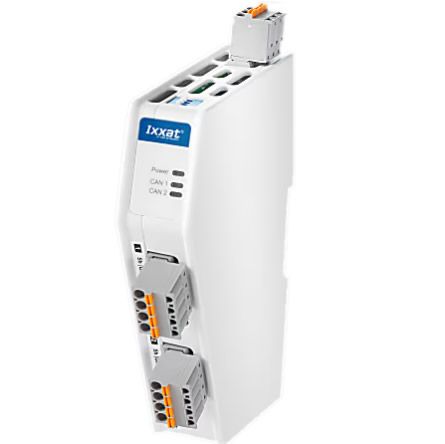We use cookies to make your experience better. To comply with the new e-Privacy directive, we need to ask for your consent to set the cookies. Learn more.
This compact repeater offers dual CAN FD channels for seamless integration and enhanced signal quality. With easy-to-adjust termination resistors and intuitive plug-in connectors, installation is a breeze. Plus, its eco-friendly packaging design as well the digitally accessible manual align with sustainability goals. Bring your network to the next level and protect it from EMI influences, optimize its topology, improve signal quality and protect valuable asset by huge galvanic isolation.
Protect your assets from overvoltage with galvanic isolation
Galvanic isolation provided by the CAN/FD Repeater Standard serves as a critical protective feature for network components. The isolation up to 5 kV prevents voltage spikes and other electrical hazards from spreading across the network, which can cause damage to sensitive electronics and lead to data corruption. By isolating different segments of the network, repeaters enable the overall resilience and safety of the system, safeguarding against both gradual degradation and acute electrical failures.
Optimize CAN network topologies
The CAN/FD Repeater Standard is crucial for optimizing the topology of CAN networks, allowing for the implementation of configurations beyond the basic line topology, such as star and tree topologies. The primary function of a CAN repeater is to regenerate the CAN signals. By using repeaters, network designers can extend the physical limits of a CAN network and they can increase the number of nodes. This capability is especially valuable in large-scale industrial settings where equipment might be spread over substantial distances.

Filter EMI influences
Electromagnetic interferences (EMI) can significantly disrupt the CAN signal integrity. The CAN/FD Repeater Standard contributes to reducing EMI influences within the network by regenerating the signal, thus dampening the noise picked up during transmission. The capability of repeaters to isolate and reconstruct signals means that disturbances from external sources are less likely to propagate through the network, ensuring cleaner and more reliable communications.

Improve the signal quality of your CAN network
The CAN/FD Repeater Standard enhances signal quality within CAN networks by regenerating and retransmitting the signals as they pass through. This process helps to restore and stabilize signal strength and shape, countering degradation from extended transmission distances or electrical noise. The repeaters ensure that signals remain strong and clear over long cable runs, crucial for maintaining data integrity and minimizing errors in communication.

The CAN/FD Repeater Standard plays an important role in manifold industries, supporting robust and reliable communication essential for operations in industrial environments such as production, automation, energy, transportation or logistics.
The widespread applications across these fields highlights the fundamental importance of CAN repeaters in modern technological infrastructures.
Automotive
BESS
Automation
Maritime
Railway
Building
Intralogistics
Energy
Medical
Robust industrial use
Designed for industrial environments, meeting high demands for robustness, temperature ranges, and safety.
Removable push-in connectors
Features removable push-in connectors, ensuring hassle-free installation and maintenance without the need for additional tools.
Cost savings due to simple wiring
Optimized topologies enable simpler wiring, resulting in less cables and cost savings at installation and maintenance.
Network monitoring and fault recovery
In case of disturbances, the repeater automatically disconnects the affected segment and restores it after the fault is resolved.
Flexibility in CAN FD network design
Helps to optimize CAN/CAN FD network structures by enabling extended layouts (stub lines, star and tree topologies).
Fast and transparent operation
Minimal impact on real-time behavior, equivalent to a short line length (ca. 35 m/175 ns delay). Enabling transparent transmission, compatible with all higher layer protocols.
Enhanced network reliability
Higher system reliability by electrically isolating CAN/CAN FD segments and power up to 5 kV DC for 1 minute. This enhances the protection of the device against damage to electronics caused by voltage peaks.
Integrated bus termination resistors
Integrated bus termination resistors for each CAN channel (120 Ohm, separately switchable by piano switches) prevent reflections on the line ends and ensure optimum communication.
- Two CAN/CAN FD interfaces supporting arbitration rates up to 1 Mbit/s and data rates up to 8 Mbit/s
- CAN/FD Transceiver TCAN1044
- CAN connection: Removable Push-In Connectors
- Externally Switchable CAN bus termination resistors
- Galvanic Isolation up to 5 kV
- Operating Temperature -25 °C to +70 °C
- Protection Class IP20
- Dimensions 108 x 149 x 27 mm
- Power-efficient design operating at less than 100 mA at 24 V DC
- Compliance with CE and FCC certifications
| Product ID | 1.01.0211.20000 |
| Predecessor | 1.01.0210.20000, 1.01.0210.20200, 1.01.0210.20210, 1.01.0210.20010,1.01.0067.44010, 1.01.0067.44300, 1.01.0067.44400 |
| HS Code | 8517620000 |
| Export Control Classification Number (ECCN) | EAR99 |
Tecnologix offers support which is directly handled by development team. Do not hesitate to get in touch with our experts.
Just ask here




